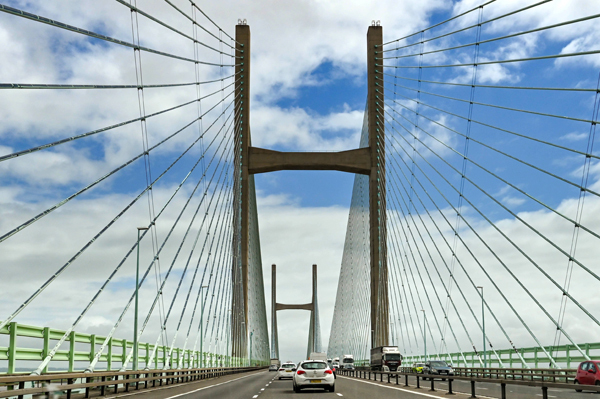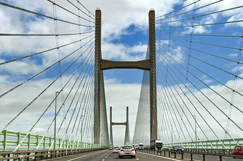The Welsh Government has cancelled a swathe of road schemes and set out new conditions for all future schemes to meet, which include not increasing road capacity and not adversely affecting ecologically valuable sites.
Only 15 of the 51 road schemes assessed by an independent Roads Review Panel will feature in the National Transport Delivery Plan for the next five years – and some of those will be revised.

Many other road schemes are cancelled or will be subject to reassessment as part of wider multi-modal corridor reviews along the A55 in the north and M4 in the south (pictured above).
The Government's proposed 'red route', linking the A55 to the Flintshire Bridge as an alternative route between North Wales and North-west England, will not proceed.
The Third Menai Crossing will be assessed by the North Wales Transport Commission, set up last year and likely to recommend a package of alternative transport improvements for movement between Anglesey and the mainland.
Welsh media reported that the new bridge was cancelled, but deputy climate change minister Lee Waters said it was not ruled out. The Third Menai Crossing would fail the capacity test and possibly the ecological one, as set out by the Roads Review Panel however
The Labour Welsh Government was heavily criticised when it announced its new priorities for transport this week, including from Labour backbenchers, but transport professionals overseas have been watching Wales since the panel was formed.
However, the process used by the Welsh Government to overhaul its policy on road building has attracted international interest because so many other countries face the same challenge of squaring their climate change obligations with the desires of governments, politicians, businesses and communities for further enlargement of the highways network.
Dr Lynn Sloman, who chaired the review panel, revealed that early on in the process, bodies in Sweden and Denmark had shown interest in the process Wales was following.
Highways understands that subsequently there was interest from other countries, including some outside Europe.
'I do think that the details of the process and where it's ended up are things that governments could learn from,' Dr Sloman told Highways.
'This isn't about hand-wringing gestures, it's about patient, detailed policy making. Personally, I feel that the process has been an exemplary one.'
Mr Waters said: 'We're the only part of the UK who are passing targets [relating to Net Zero carbon] but also taking the actions to implement the targets, and that's not an easy thing to do.'
Local authority road schemes which the panel reviewed remain on hold but councils can apply for funding for them in future years.
However, the schemes would have to meet the new criteria and Mr Waters emphasised the Government's shortage of funding following the events of 2022.
Road building will be supported in Wales where it supports modal shift (for example improving access to Severn Tunnel Junction station from the B4245) where it improves safety through small changes or where it helps Wales to adapt to climate change (as with the current construction of a flood-proof bridge over the Dyfi at Machynlleth).
A fourth category is roads which provide access and connectivity to jobs and centres of economic activity in a way that supports modal shift.
Despite the panel's detailed work, the Welsh Government has not firmed up its approach to such roads. Ministers asked the leaders of Torfaen and Anglesey councils to work with the Government on a sample of schemes designed to connect to economic development sites.
The schemes will be reshaped for consistency with the new roads policy. The Government envisages several exemplar developments where planning and transport are enmeshed so that the new housing does not enforce or encourage dependency on cars.
An important – but largely overlooked – part of the the Sloman Review's brief was to 'consider how any savings might be allocated, in order to ensure problems on the road network are addressed, and in particular to make recommendations on how to tackle the backlog of road maintenance'.
Another independent panel, led by Matthew Lugg, assessed the programmes of work for the Strategic Roads Network, for which the Welsh Government is responsible.
Dr Sloman's panel recommended a Zero-Base Review of road maintenance and renewal schemes so that 'critical schemes take place first and are not crowded out by less important schemes'. This arose from the advice of the Lugg Review.
'Rather than incrementally adjusting budget upwards or downwards based on expenditure in the previous year, all proposed expenditure for both new and ongoing maintenance and renewal activity should be evaluated in a systematic way, and prioritised so that the most urgent and important schemes are progressed,' said the Sloman Review.
'We do not recommend that financial savings from cancelled enhancement schemes should be diverted to undertake asset renewal schemes that would otherwise be unfunded because of lower priority.'
Picture: Chepstow, Wales - May 2022: Traffic approaching the Prince of Wales Bridge on the M4 motorway. Stock Photo ID: 2177919907
































